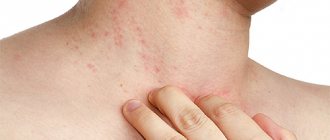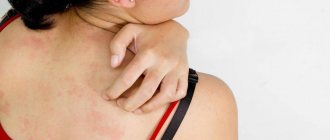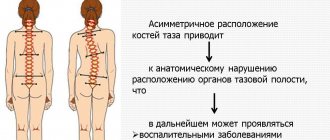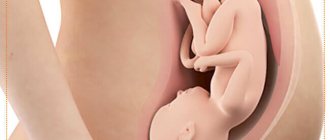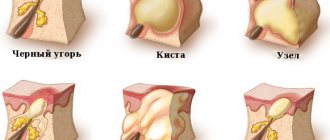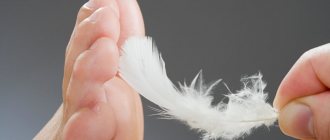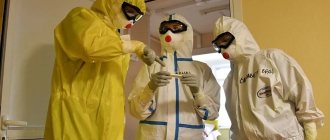A common case is when, due to emotional shock, different reactions occur in the body. You can often hear: “...everything itches, after being overexcited, or itching due to nervousness.” The first symptoms of any allergic reaction may be similar to many skin diseases (psoriasis, dermatitis, eczema). In such cases, professional diagnosis by an experienced doctor is required. However, a pattern is often visible: a person feels irritation on the skin, itching, rashes, redness after a nervous shock. It is worth understanding how stress affects allergic skin reactions and studying the etiology of unpleasant sensations.
Symptoms
The main symptom of urticaria is the appearance of blisters on the skin , which, unlike the blisters that form with pemphigus or burns, are not filled with liquid inside, but are more like marks from insect bites.
Blisters with nervous urticaria are located in large groups, as after nettle burns, hence the name of the disease - urticaria.
Blisters can appear on any part of the body and migrate from day to day (for example, appearing on the back one day, on the stomach or legs the next). If urticaria appears due to nervousness, the symptoms may be as follows :
- pressing pain in the heart;
- lack of appetite;
- dyspnea;
- trembling in the limbs;
- anxiety.
All this confirms that stress is the cause of urticaria.
After healing, there are never any traces left - no scars, no pigmentation.
Next, let's see what nervous urticaria looks like: photos on different parts of a woman's body.
Could a rash be caused by nervousness?
This is quite a pressing question, but to this day no one can give a definitive answer to it.
In some countries around the world, doctors diagnose “psychogenic urticaria.” It is based on the results of many years of research on people suffering from long-term depression, vegetative-vascular dystonia syndrome (VSD) and other debilitating disorders.
In mentally unstable people, in addition to the main symptoms, rashes on the hands in the form of blisters (urticaria) were observed.
Most medical researchers claim that stress is a trigger for urticaria due to nerves, since favorable conditions appear in the body for the immune system to malfunction.
Relapses of chronic diseases of the digestive and respiratory systems appear. There is also a high risk of disruption of the endocrine system, which contributes to the development of allergies. Actually, this is how an inadequate reaction mechanism and increased sensitivity to external stimuli are triggered.
Today, scientists have proven that prolonged negative emotions contribute to the deterioration of the body’s condition. However, practicing allergists use an individual approach to treating patients due to the fact that for some, nervousness is a common condition, and for others, it is a trigger for an exacerbation of the reaction.
Causes
In nervous disorders, psychogenic urticaria occurs due to a distortion of the signals that the central nervous system sends to the capillaries of the skin. The capillaries expand, blood rushes to the surface, and its normal circulation is disrupted. At the same time, the cells lining the vessels from the inside swell. As a result, the skin turns red, numerous blisters (rashes) form on it, and swelling occurs.
Thus, the root cause of pathological changes is signals from the central nervous system distorted due to stress .
Seeing a doctor and diagnosis
If you have nervous urticaria, you should consult a doctor after the first appearance of blisters and redness that occurs due to stress.
Especially if the disease affects the child, because Urticaria in children is often more severe.
Treatment will be prescribed by a psychotherapist , since the cause is psychological in nature.
However, you will also have to be examined by an allergist-immunologist in order to exclude purely allergic, autoimmune roots of the disease.
To diagnose nervous urticaria, you will have to undergo some tests , such as:
- General urine analysis.
- Blood tests, biochemical and clinical.
- Test for antibodies to viral hepatitis.
- Test for syphilis.
- Blood test for nuclear factor.
- Test for antibodies to protozoan parasites (Giardia, Toxoplasma and others).
- Stool analysis.
- ECG and ultrasound of the heart.
- Allergological research.
If other diseases are suspected, in addition to nervous urticaria, other tests are possible .
Treatment
Principles of treatment based on dermatological and neurological factors.
If urticaria is caused by neurological causes, then treatment will be directed in two main directions:
- elimination of symptoms;
- eliminating the cause (nervous disorder).
To eliminate the causes of urticaria, you should take sedatives and antipsychotics , apply psychological practices aimed at eliminating irritability, defeating fears and anger, etc., to learn these practices, it is better to contact a psychologist (a simple training can be learned in one session) .
In severe cases, full-fledged psychotherapy may be necessary..
Spa treatment also helps well, since it combines the use of various exercises and medications with a change of environment, which has a beneficial effect on the psychological state.
Peppermint tea has a beneficial effect on the nervous system for urticaria, but before using herbal remedies, you should consult your doctor.
Itching Remedies
- Menthol, diphenhydramine and salicylic acid are used as anti-itch medications . Alcohol solutions of these substances are used for rubbing or compresses, and within 30 minutes to an hour the itching goes away.
- Non-hormonal ointments Nezulin, Skin-up, Fenistil, Gistan, etc., which should be applied to the affected area and rubbed in a thin layer, will also help with nervous urticaria. Then the ointment is absorbed into the skin and begins to act.
- Fexofenadine, Astemizole and Loratadine can be used internally .
- A good folk remedy for hives is ordinary table vinegar . You can soak a cotton swab with it and lubricate bothersome areas of skin with rashes.
What should you do first and what should you avoid?
First of all, you need to see a doctor . This unshakable rule applies to any disease, because... only a specialist can correctly diagnose and prescribe treatment.
Since hives are caused by strong nervous feelings, you need to focus on solving this problem: change the environment, take sedatives (after consulting with a doctor), consult a psychologist.
It is also advisable to change your lifestyle. All this will reduce the load on the nervous system and help overcome stress.
There is no need to start self-medication, especially before an accurate diagnosis has been established . This can cause significant harm to health. Also, there is no need to worry and be afraid, because the disease is already caused by nervous disorders, there is no need to add.
Any excesses are also harmful, especially in food, alcohol and smoking. It is better to refrain from bad habits. Heat and cold, ultraviolet radiation will complicate the problem, so you need to, if possible, rid yourself of these natural factors. And of course, contact with organic allergens should be avoided . Also avoid washcloths and woolen clothing, which can irritate the skin.
Tablets and ointments
Usually sedatives and antihistamines are prescribed , such as tavegil, diazolin, tazepam, pipolfen, fenkarol and others. For the normal functioning of the immune system and gastrointestinal tract, various vitamins are used : riboflavin, calcium supplements, ascorbic and nicotinic acid, pyridoxine and similar drugs.
Diphenhydramine remains an excellent remedy against itching . If the hives appear to be recurrent, the doctor will prescribe corticosteroid hormones such as prednisone or prednisone.
Along with the tablets , ointments should also be used in order to suppress the disease in two directions at once.
The most effective of them are known under the trade names “Elocom” and “Advantan”, “Deperzolon”, “Lorinden S”, “Flucinar” and “Ftorokort”.
Zinc-water pastes with 233% naphthalan oil are often used. Use 1% menthol solution, salicylic acid and calendula decoction against itching.
Folk remedies
Use the following folk remedies for nervous urticaria:
- Infusion of knotweed (20 g) in 250 g. water (infused for 2 hours) Take 3 times a day, 1 tbsp. spoon. Excellent for calming nerves.
- Infusion of wormwood (a teaspoon per 500 grams of water, infused for two hours), consume 2 times a day, 1 tablespoon.
- To prevent stress, you can eat a few cubes of chocolate , but if hives from nerves have already begun, chocolate.
- Motherwort herb is good for calming nerves . 15 gr. leave for 40 minutes. in a glass of hot water and take 5 times a day, 1 tbsp. spoon.
- Dill juice . Squeeze the juice from washed dill, dip a cotton swab or napkin in it, and apply to the rash areas.
- 2 glasses of nettle infusion (can be bought at a pharmacy) per day will help those who are not allergic to this plant.
- a liter of wild rosemary infusion in a bath of warm water and soak in this solution for 20-30 minutes.
- Instead of dill juice, you can use clover juice . To do this, the leaves of this plant are passed through a meat grinder, and then the resulting green mass is squeezed out.
Diet
Many foods can cause allergies , and therefore such foods should be excluded during treatment for urticaria.
These products are:
- broths;
- chicken, liver;
citrus;
- smoked and pickled foods;
- eggs;
- spicy foods, spices;
- margarine;
- red vegetables and root vegetables, sorrel, spinach;
- fish;
- carbonated drinks;
- cocoa, chocolate and coffee;
- confectionery;
- carbonated drinks;
- semi-finished products;
- melons and watermelons;
- pineapples and pomegranates;
also eliminate excesses in food of all kinds : eat less salt, less sugar, less protein foods, and so on. It is preferable to have fasting days every week. You can find out more about the diet for urticaria in our publication by clicking on the link.
Main provoking factors
Acne on the face most often occurs for the following reasons:
- changes in hormones;
- chronic pathologies;
- taking hormonal medications;
- insufficient skin care;
- endocrine disorders;
- poor nutrition.
The most common cause of rashes is hormonal changes in the body. This phenomenon is often observed during adolescence, during pregnancy and menopause in women.
Acne can affect not only the face, but also other parts of the body. Such rashes are difficult to treat, as they are associated with a riot of hormones in the body. Usually the problem goes away on its own after the end of the restructuring in the body.
Endocrine disorders, which often result in pathologies, can also cause surges in the functioning of the hormonal system.
Taking medications containing hormones can also lead to dermatological problems. Medicines of this type include contraceptives, which a girl or woman can often use.
Secondary causes of acne development are insufficient or improper care. Poor cleansing of the skin and the use of low-quality cosmetics leads to the fact that the sebaceous ducts become clogged with sebum and dirt particles, resulting in the formation of a rash.
A person who is accustomed to frequently eating junk food, which includes all fried and fatty foods without exception, often suffers from acne. Food products in this category activate the intensive work of the sebaceous glands, resulting in the active proliferation of bacteria that provoke inflammatory processes in the dermis. Proper and thorough care of the epidermis, as well as avoiding unhealthy foods, will help you get rid of this type of acne.

